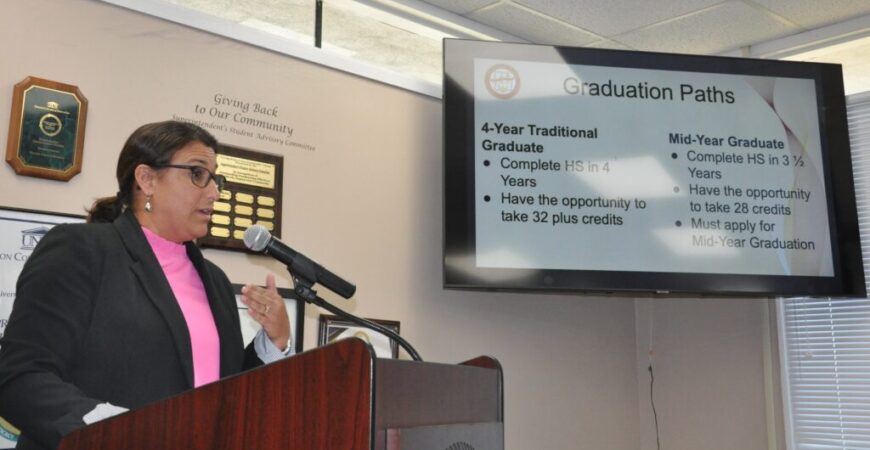KENANSVILLE — At the July 2 meeting of the Duplin County Board of Education, two policy updates were approved, which update graduation and promotion requirements for high school students and eighth-graders.
Erica Jones, director of CTE/9-13 curriculum, made a presentation to the board, filling them in on all the changes for upcoming school years.
“The first thing we’re going to be looking at are the new promotion requirements that are tied to our career development plan,” she explained. “Senate Bill 193, which passed in March, requires that all middle and high school students have to have a career development plan within 90 days in order to be promoted from eighth grade to ninth grade. And then we have to revise that plan to be promoted from 10th grade to 11th grade.”
She added that this wasn’t a huge change for Duplin County Schools, since most students already have career development plans in the eighth grade. The school system will use a software system that parents will have access to, she added.
House Bill 259, another recently passed piece of legislation, states that local boards cannot require any additional credits beyond those mandated by the state Board of Education for high school graduation. “It also required that we develop a sequence of courses and outline a process that we must make students aware of, where we allow them to graduate in a three-year period of time if they desire to,” Jones said.
“The minimum requirements listed for the state have not changed,” she added, “except for the arts elective for 2025-26 and the computer science credit for the 2026-27 freshman classes. The change really is that in the past, as a board, we were allowed to require six additional electives to include a STEAMA pathway beyond the state minimum of 22. Now we’re not able to require that; we can only recommend it as a district. We can recommend that students complete at least 28 credits to include a STEAMA pathway.”
Moving forward, Duplin County high school students will have three different paths to graduation, Jones explained. “The first is your traditional four-year graduate, which is no different than we’ve always done,” she said. “So they have the opportunity to take 32-plus credits. The second one is a mid-year graduate, which is still no different. We already had mid-year graduates, they take 28 credits and go for three and a half years. The third one, this is the new one required by HB 259, that’s your three-year accelerated graduate. They complete high school in three years and they would have the opportunity to take up to 24 credits. They must apply for this path prior to entering the ninth grade.”
Students must make the decision on which graduation path to pursue prior to entering the ninth grade.
Jones noted that students attending Duplin County Early College are not eligible for the three-year path, due to the nature of the early college.
In addition to House Bill 259, there was also Session Law 23-132, which requires the 2026-27 freshman class to have a passing grade in a high school computer science course. “This course requirement can be met by taking a high school computer science course in middle school,” Jones explained. “Due to the fact that our computer science course offerings in the high schools do not have the capacity to handle every student taking computer science in high school, we’ve come up with a plan for our middle grade CTE business teachers to teach computer science discoveries to our sixth- and seventh-graders. And then to our eighth-graders, they will teach an introduction to computer science course, which will be for a high school credit.”
Students who cannot complete the computer science course in middle school will have other options open to them when they enter high school, Jones said, but the new requirement should cover the majority of students.
The updated policies, Student Promotion and Accountability and Graduation Requirements, were approved as part of the consent agenda, with no discussion from the school board members.
 Twitter
Twitter Facebook
Facebook Instagram
Instagram






